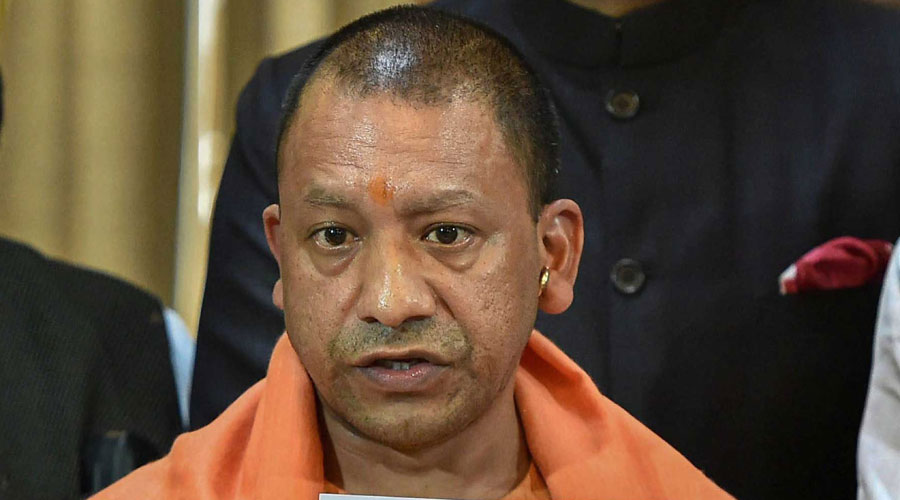Top Brahmin politicians from Uttar Pradesh called on BJP chief J.P. Nadda on Monday and were purportedly tasked with ensuring the support of the community in the Assembly elections, the meeting betraying the party’s unease at anger within the influential caste.
A group of nine leaders, including ministers, MPs and MLAs, met Nadda in Delhi at a time there have been murmurs that Brahmins are upset with the Yogi Adityanath government’s “Thakurvaad”, a term used to describe the dominance of the Thakur or Kshatriya caste.
Brahmins constitute approximately 10 per cent of Uttar Pradesh’s population and are said to wield influence on a great many others because of their position in the caste hierarchy.
Chief minister Adityanath, a Thakur, has often been accused of giving undue patronage to his castemen, suffusing them with power much to the chagrin of other castes.
The Brahmin leaders called on Nadda after the BJP’s election in-charge in Uttar Pradesh, Union education minister Dharmendra Pradhan, held a meeting on Sunday to constitute a four-member committee to oversee the campaign to court the community.
The committee has two former Union ministers — Shiv Pratap Shukla and Mahesh Sharma — and two state-level leaders. Both Shukla and Sharma were said to have been displeased with the leadership for being sidelined.
Shukla, a Rajya Sabha MP and an influential Brahmin face from eastern Uttar Pradesh, was a minister in the first Narendra Modi government but was dropped in the second. Sharma, who represents Gautam Buddh Nagar (Noida) in the Lok Sabha, was not made minister in the current Modi government.
Apart from the four committee members, the group that met Nadda on Monday included other prominent Brahmin politicians from Uttar Pradesh, including some ministers in the Adityanath government.
“Confusion is being spread among Brahmins by the SP (Samajwadi Party) and the BSP (Bahujan Samaj Party) that their community is being neglected. We will aim to highlight the work done by the BJP and impress upon them (the Brahmins) that it is the BJP which has worked for the Brahmins,” committee head Shiv Pratap Shukla told the news agency ANI. He said the committee would remove the misconceptions among Brahmins.
The sense of hurt among Brahmins under Adityanath doesn’t augur well for the party as the community has been seen as its natural votary.
“The top leadership had taken the Brahmins for granted but feedback from the ground has spread concern,” a BJP leader from eastern Uttar Pradesh said.
Brahmins had in previous elections voted tactically, even backing a predominantly Dalit party like Mayawati’s BSP, a fact taken into consideration by the BJP as it prepares not to take any chances.
Adding to the BJP’s worries is that a good number of Brahmin leaders, mainly from the BSP, have recently joined the Samajwadi Party, which has emerged as the principal challenger to the ruling BJP.
In the caste-ridden politics of Uttar Pradesh, the rivalry between Brahmins and Thakurs for political and social dominance is well known. In the past, Brahmin voters had backed the BSP and the Thakurs the Samajwadi Party in a bid to secure political clout.
After the emergence of the BJP as a strong force at the Centre and in the state, the majority of the two castes have backed the saffron party. The BJP, however, fears that after five years of Adityanath’s rule and the emergence of the allegations of “Thakurvaad”, the traditional fault lines between the two castes could re-emerge.
“Ideologically, most Brahmins favour us (the BJP). But due to local factors and the perceived dominance of the Thakurs, many Brahmins could break ranks or become disinterested in voting,” a BJP parliamentarian said. “Our effort is to ensure that Brahmins support us with the same enthusiasm as they did in 2017.”
The BJP had won a record 300-plus seats in the 403-member Assembly in the last state elections.
Varun attack
Rebel BJP parliamentarian Varun Gandhi, a Brahmin leader, slammed the Modi and Adityanath governments for holding political rallies during the day and imposing curfew at night to contain Covid.
“To impose curfew at night but hold rallies during the day where lakhs attend. This is beyond the understanding of the ordinary citizen,” Varun tweeted.
“Keeping in mind the limited health infrastructure of UP, we will have to honestly introspect whether our priority is to fight the rapid spread of omicron or demonstrate political heft via large crowds at political rallies,” the Pilibhit MP added.











